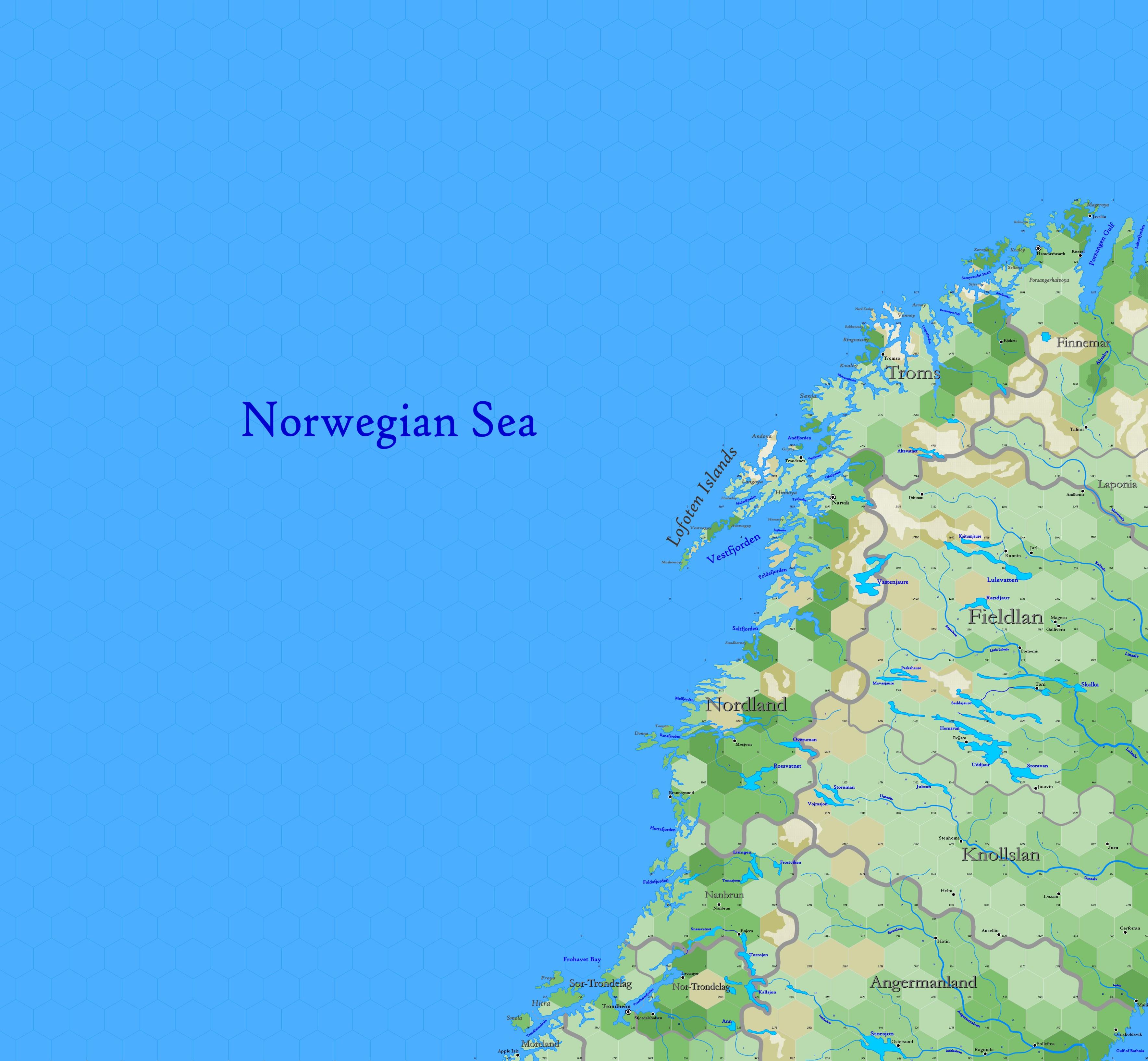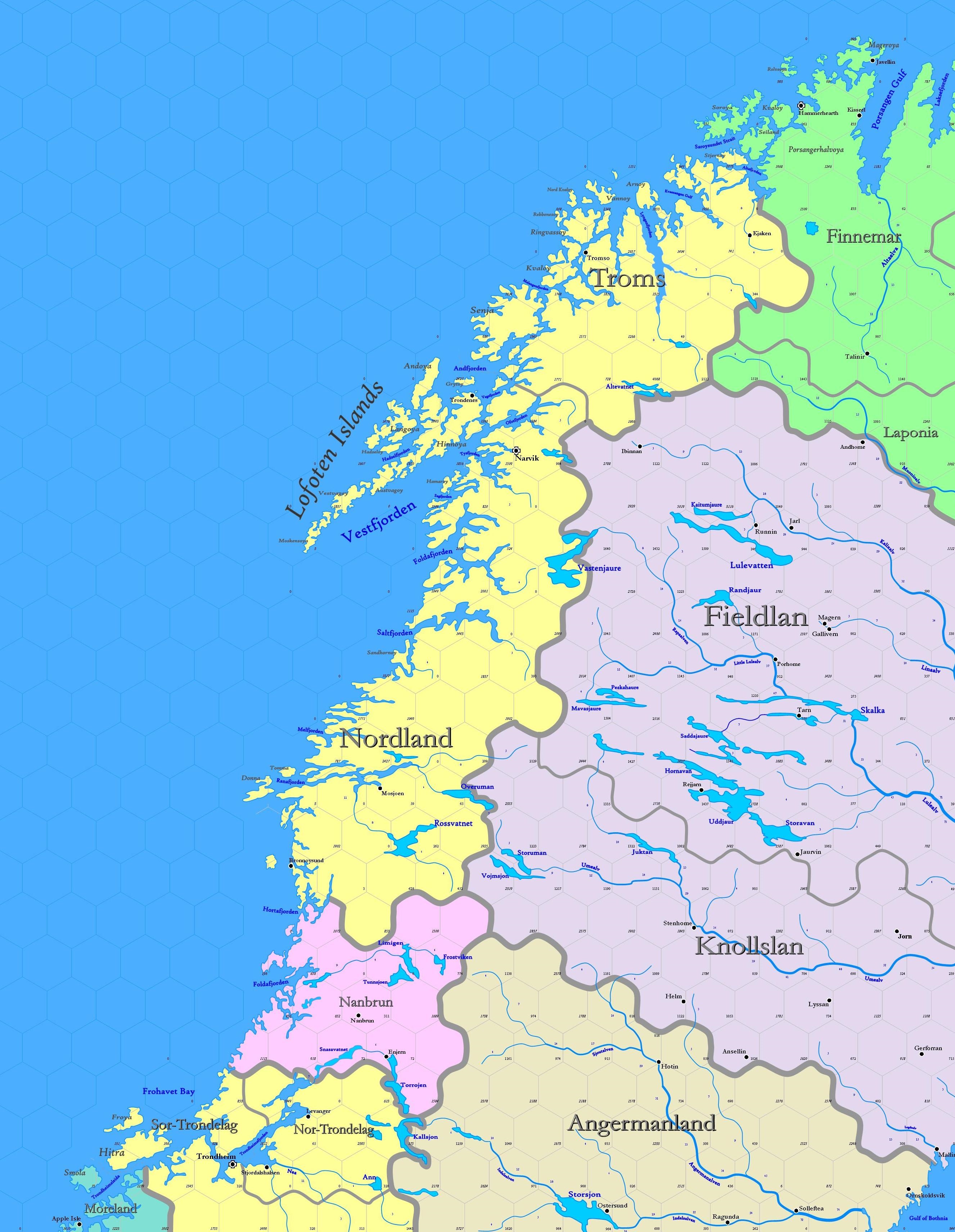Difference between revisions of "Map B.01 - Lofoten"
Tao alexis (talk | contribs) |
Tao alexis (talk | contribs) |
||
| Line 12: | Line 12: | ||
The '''Scandes''' form a backbone that forms a rigid boundary between the western Norse provinces and the Baltic provinces of the east. The mountains are not very high but are very steep in places; their shape has enabled the formation of many ice fields and glaciers. The northern range is collectively known as the Kjølen, where the mountains are narrower north of '''Trondelag'''. Most of these mountains lack [[Alpine (range)|alpine]] ranges, as their steep sides and rocky peaks give little purchase for flora or fauna of that type. In the upper valleys, however, [[Tundra (range)|tundra]] ranges predominate. | The '''Scandes''' form a backbone that forms a rigid boundary between the western Norse provinces and the Baltic provinces of the east. The mountains are not very high but are very steep in places; their shape has enabled the formation of many ice fields and glaciers. The northern range is collectively known as the Kjølen, where the mountains are narrower north of '''Trondelag'''. Most of these mountains lack [[Alpine (range)|alpine]] ranges, as their steep sides and rocky peaks give little purchase for flora or fauna of that type. In the upper valleys, however, [[Tundra (range)|tundra]] ranges predominate. | ||
| − | == Denmark & Norway | + | == Norwegian Provinces == |
| + | The most populated and significant entity on the map, a part of the human [[Kingdom of Denmark & Norway]]. | ||
Revision as of 22:42, 6 July 2021
Sub-arctic region reaching from 77.22°N south to 62.96°N, including the upper peninsula of Scandinavia, a region shared by many races. The upper peninsula is formed of an elevated plateau which rises steeply from the Atlantic. The irregular outline of the has been caused by the same agent, a glacier or river of ice. The sides of the fjords are steep and often rise to heights of 4,000 ft. At the head of each fjord is a meadowland surrouding a stream descending from the mountains. Arranged along the coast is the skerry-guard, hundreds of small, rocky islands that act as a protection from the Atlantic storms. There is a near continuous quiet water route through the lee of these islands. These islands allowed the Norse to learn their sailing trade.
Hexes are 20 miles in diameter. Total area depicted equals 403,095 sq.m.
Features
Norwegian Sea
A marginal sea in the Atlantic, between the North Sea and the Greenland Sea, the latter boundary marked by the island of Jan Mayen. The Norwegian Sea has a great depth and for that reason has never been associated with a subterranean culture. The coastal zones are rich in fish, with Norway has long exploited. The North Atlantic Current ensures stable temperatures the year round, so that unlike the Greenland Sea, the Norwegian is ice-free.
The Scandes form a backbone that forms a rigid boundary between the western Norse provinces and the Baltic provinces of the east. The mountains are not very high but are very steep in places; their shape has enabled the formation of many ice fields and glaciers. The northern range is collectively known as the Kjølen, where the mountains are narrower north of Trondelag. Most of these mountains lack alpine ranges, as their steep sides and rocky peaks give little purchase for flora or fauna of that type. In the upper valleys, however, tundra ranges predominate.
Norwegian Provinces
The most populated and significant entity on the map, a part of the human Kingdom of Denmark & Norway.

